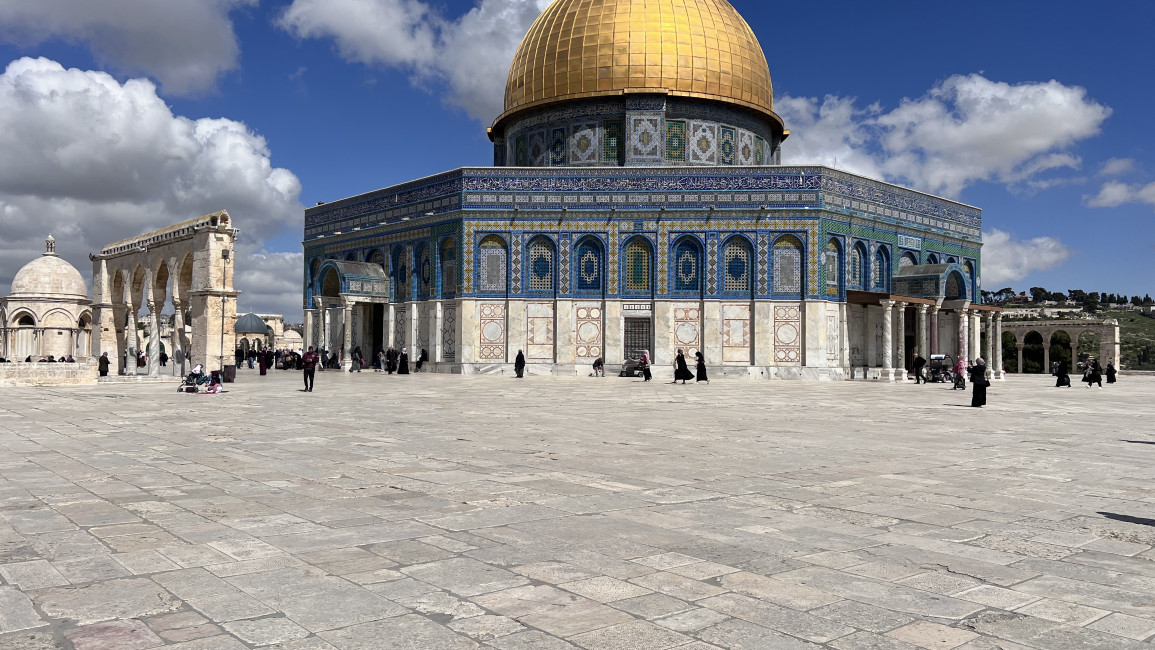'Al-Aqsa is still in danger': Palestinians sceptical of Israeli PM's halt on Jewish visits
Israeli PM Benjamin Netanyahu has temporarily halted Jewish visits to the Al-Aqsa compound following weeks of high tensions at the holy site. The ban on Jewish visits and tourists would remain until the end of the holy month of Ramadan.
The much-anticipated decision came following the unanimous recommendation of the heads of Israel's security services, including the reinstated defence minister Yoav Galant, the army's chief-of-staff Herzi Halevi, and the Israel security agency director Ronen Bar, and the Israel police inspector General Kobi Shabtai, a statement from the Israel government press office said.
This year's decision aligns with previous years, but there was speculation that the current far-right government would seek to change that.
Israel's national security minister Itamar Ben Gvir slammed Netanyahu's decision calling it a "serious mistake that will not bring peace, instead would risk escalating the security situation further...and will create fertile ground for massive demonstrations of incitement to murder Jews and even a scenario in which stones will be thrown at Jewish worshipers at the Western Wall."
According to the al-Awqaf Council, the Israeli police have escorted nearly 3,600 Jewish visitors to the al-Aqsa compound during Passover alone. The Passover holiday, or Pesach in Hebrew, started on 6 April and ends on Thursday evening. The widely observed holiday, according to biblical texts, marks the Israelites' departure from ancient Egypt.
Hanadi Halawini, a Palestinian resident of occupied East Jerusalem, told The New Arab that the perseverance of Muslim worshipers had pushed the Israeli government to "back down" and cancel Jewish visits during the last ten days of Ramadan.
Halawani, 43, a well-known figure in East Jerusalem, told TNA that the Israeli police routinely ban her from entering the al-Aqsa without explaining.
"There is no clear accusation, not even questioning, only a secret file they say."
Since the start of Ramadan, the Israeli police have aggressively removed hundreds of Mulsim worshipers from the al-Aqsa compound, mainly in the evening upon the conclusion of Taraweeh prayers. It has also imposed entry restrictions on Muslim worshipers wishing to enter the holy site for Fajr or dawn prayers.
The motivation behind the Israeli police's actions is to drastically limit the number of Muslims in the compound while Jewish visitors, mainly Jewish nationalists, tour and occasionally pray or display the Israeli flag.
The Israeli police allow Jewish visits five days a week from Sunday to Thursday, in two batches, in the morning and the afternoon.
הבוקר מול המסגד הפתוח באלאקצה : שוטרים בכינון ישיר לעבר המסגד והמתפללים. עליונות יהודי היא גזענית מבזה. דמוקרטיה כובשת היא אוקסימורון pic.twitter.com/eLlPHudrjL
— Ahmad Tibi (@Ahmad_tibi) April 11, 2023
"This morning in front of the open mosque in Al-Aqsa: police officers in formation directly towards the mosque and the worshippers. Jewish supremacy is shamefully racist. Conquering democracy is an oxymoron," Arab MK tweeted in response to images of Israeli police officers pointing their guns at Palestinians inside the al-Aqsa as Jewish visitors were in the compound.
This Ramadan, I'tikaf, the practice of seclusion in the mosque, gained momentum among Palestinians in order to counter Jewish nationalists who seek to gain control of the holy site they call the Temple Mount.
"It [I'tikaf] has become a duty," Halawani said, who has been barred from entering the al-Aqsa for the past nine months.
"Muslim presence is the only guarantee to protect the al-Aqsa in the face of the threats and assaults. I'tikaf in large numbers. The occupation feared the large numbers of worshipers and backed down," she added.
Before Passover, Jewish rabbis and Israeli politicians from the far-right called on the government to allow Jews to perform the Jewish Passover sacrifice inside the al-Haram al-Sharif, putting Muslims on alert. According to Jewish tradition, the Passover sacrifice was a ritualistic lamb slaughter at the Jewish Temple annually.
Amjad Shehab, a political scientist, sees the outcome of the latest round as inconclusive despite the decision to halt the Jewish visits.
"The clash has been postponed for another time but the al-Aqsa is still in danger," he told TNA.
Shehab said he'd been surprised when the "resistance" fired rockets towards Israeli towns from the south of Lebanon last week.
On 6 April, rocket salvos from southern Lebanon hit several areas in western Galilee. Israel retaliated with limited strikes against Hamas bases in Lebanon and Gaza.
"The resistance in Lebanon and Gaza have brought back confidence to the Palestinians in East Jerusalem. They understood they're not alone, they have people behind them," he added.



